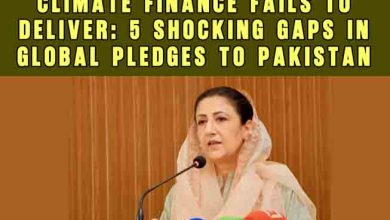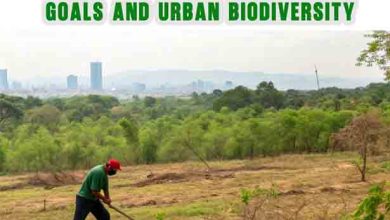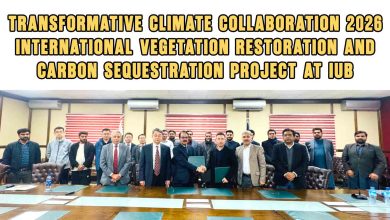#Pakistan needs $600m to prevent #climatedamage: study
#KARACHI: Pakistan needs to invest at least $600 million in adaptation measures to prevent #climatedamage and avoid a slowdown in #economicgrowth, according to a new study by Standard Chartered.
Pakistan’s risk to disaster stands the higher in the #world. In Pakistan in 2022, devastating floods brought on by heavy #monsoon #rains and melting glaciers resulted in a loss of life, forced population displacement, and caused a #shortage of #food and #cleandrinking #water, the study published by Standard Chartered, “The Adaption Economy: The case for early action on climate adaptation in emerging markets,” stated.
“Pakistan would need significantly higher levels of adaptation investment under a 3.5°C scenario, emphasising the importance of global mitigation efforts; rising temperatures would trigger changes to #rainfall and run-off regimes and increase flood risks,” it said.
“Pakistan currently has a moderate level of adaptation measures in place but could expect to see a $13 return per dollar of adaptation investment. In a 1.5°C warming scenario, the minimum investment required to keep pace with damages as they occur this decade is $600 million, whereas inaction could cost the Pakistan economy $7.6 billion,” it added.
Without adaptation, millions of people would face flooding annually. #Pakistan would also suffer increased drought, affecting key crops like cotton and wheat.
#Agriculture alone employs nearly 40 percent of Pakistan’s workforce and contributes over 22 per cent to its #GDP, making potential climate impacts and adaptation needs in the sector a high priority, the study noted.
The study suggested the country to focus on improving management of water resources and strengthening flood risk management in vulnerable areas. Sustainable management of watersheds and mangrove forests has been highlighted as a key focus by the #World Bank, alongside upgrades to #wastemanagement, safe #water in urban areas and enhanced disaster resilience.
It said failure to invest the bare minimum needed to withstand projected climate damage could cost emerging markets hundreds of billions in climate damages and lost GDP growth this decade.
The Adaptation Economy, which investigates the need for climate adaptation investment in 10 markets – including China, India, Bangladesh and Pakistan – reveals that, without investing a minimum of $30 billion in adaptation by 2030, these markets
could face projected damages and lost #GDP growth of $377 billion: over 12 times that amount.
The projection assumes that the world succeeds in limiting temperature rises to 1.5°C, in line with the Paris Agreement. In a 3.5°C scenario the estimated minimum investment required more than doubles to $62 billion and potential losses escalate dramatically if the investment is not made.
Examples of climate adaptation projects include the creation of coastal barrier protection solutions for areas vulnerable to flooding, the development of drought-resistant crops and early-warning systems against pending natural disasters, according to the report.
Among the 10 markets in the study, India is projected to benefit the most from adaptation investment.
The market would require an estimated $11 billion to prevent climate damages and lost growth of $135.5 billion in a 1.5°C warming scenario – equal to a thirteen-to-one return for the Indian economy of investment in climate adaptation.
Meanwhile, #China could avoid an estimated cost of $112 billion by investing just $8 billion. And Kenya could avoid costs of an estimated $2 billion by investing $200 million in adaptation.
“Even if the world’s nations manage to achieve the goals of the Paris Agreement, measures to adapt to climate change must be pursued alongside the global decarbonisation agenda, with the banking sector having a critical role to play in unlocking finance,” it said.
The $30 billion investment required for adaptation represents only slightly more than 0.1 percent of combined annual GDP of the 10 markets in the study and much less than the estimated $95 trillion emerging markets require to transition to net zero using mitigation measures, as outlined in Standard Chartered’s Just in Time report.
The Adaptation Economy also surveyed 150 bankers, investors and asset managers and found that, currently, just 0.4 percent of the capital held by respondents was allocated to adaptation in emerging markets where investment was needed most.
However, 59 percent of respondents plan to increase their adaptation investments over the next 12 months. And on average, adaptation financing is expected to rise from 0.8 percent of global assets in 2022 to 1.4 percent by 2030.







